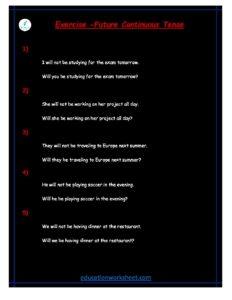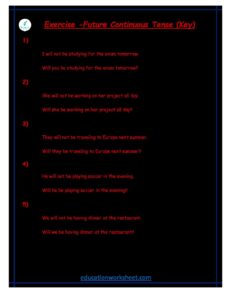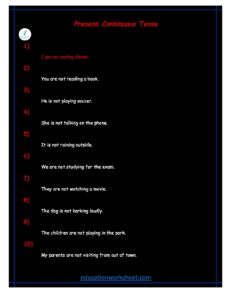changing Future Continuous Tense to negative and interrogative
changing Future Continuous Tense to negative and interrogative
Future Continuous Tense is a fundamental grammatical structure used in English to describe actions or events that will be ongoing at a specific point in the future. It is often used to convey the idea that something will be happening at a particular time, making it a valuable tool for expressing future plans, expectations, and predictions. However, like any other tense in English, the Future Continuous can be transformed into negative and interrogative forms to ask questions and make negative statements. In this comprehensive guide, we will delve deep into the intricacies of transforming Future Continuous Tense into negative and interrogative forms.
Understanding Future Continuous Tense:

Before we explore how to change the Future Continuous Tense into negative and interrogative, let’s briefly recap what Future Continuous Tense is and how it’s constructed. This tense is formed by using the auxiliary verb “will” followed by “be,” and then the present participle form of the main verb (-ing form). For example:
- Affirmative: I will be working.
- Negative: I will not be working.
- Interrogative: Will I be working?Changing Future Continuous Tense to Negative: Transforming Future Continuous Tense into the negative form is relatively straightforward. To make a negative sentence, you need to insert “not” after the auxiliary verb “will.” Here’s the general structure:
Affirmative: [Subject] will be [base form of the verb]… Negative: [Subject] will not be [base form of the verb]…
For example:
- Affirmative: She will be studying.
- Negative: She will not be studying.
When forming negative sentences in Future Continuous Tense,

you can also use the contraction “won’t,” which is a combination of “will not.” Here’s how it looks:
- Affirmative: I will be traveling.
- Negative (contraction): I won’t be traveling.
Additionally, you can use the full form “will not” for emphasis, and “won’t” for informal or conversational contexts.
Changing Future Continuous Tense to Interrogative: Turning Future Continuous Tense into an interrogative (question) form requires inverting the order of the subject and the auxiliary verb “will.” The structure is as follows:
Affirmative: [Subject] will be [base form of the verb]… Interrogative: Will [subject] be [base form of the verb]…?
For example:
- Affirmative: They will be playing.
- Interrogative: Will they be playing?
When forming interrogative sentences in Future Continuous Tense,

it’s important to note that you do not need to change the form of the main verb. You only need to invert the order of the subject and the auxiliary verb “will.” The question mark at the end of the sentence indicates that it is a question.
Adding Question Words: You can further enhance interrogative sentences in Future Continuous Tense by adding question words (also known as interrogative adverbs) such as “when,” “where,” “why,” “what,” and “how.” These words help specify the details of the action or event. Here’s how to incorporate question words into interrogative sentences:
- Interrogative with “when”: When will he be arriving?
- Interrogative with “where”: Where will they be traveling?
- Interrogative with “why”: Why will she be working late?
- Interrogative with “what”: What will you be doing tomorrow?
- Interrogative with “how”: How will they be celebrating the anniversary?Examples of Transforming Future Continuous Tense: Now, let’s explore some examples of changing Future Continuous Tense into negative and interrogative forms.
Affirmative:
- They will be having dinner at 7 PM.
- I will be studying for the exam.
- He will be attending the conference.
Negative:
- They will not be having dinner at 7 PM.
- I will not be studying for the exam.
- He will not be attending the conference.
Interrogative:
- Will they be having dinner at 7 PM?
- Will I be studying for the exam?
- Will he be attending the conference?
Interrogative with Question Words:
- When will they be having dinner?
- Why will I be studying for the exam?
- Where will he be attending the conference?
- Usage and Common Scenarios: The Future Continuous Tense in its negative and interrogative forms is used in various contexts to convey information or seek information about actions or events that will be happening in the future.
- Negative Future Continuous Tense is used to express the absence of an ongoing action in the future, or to state that something will not occur at a specific time.
- Example: She will not be sleeping during the meeting.
- Interrogative Future Continuous Tense is used to ask questions about future actions, plans, or expectations.
- Example: Will they be arriving before lunch?
- Future Continuous with question words is used to seek specific details about the action or event.
- Example: How long will you be working on that project?Practice Exercises: To reinforce your understanding of changing Future Continuous Tense to negative and interrogative, here are some practice exercises:
A. Convert the following affirmative sentences into negative sentences:
- She will be cooking dinner.
- They will be playing in the park.
- I will be taking a nap.
- He will be fixing the car.
- We will be watching a movie.
B. Turn the following affirmative sentences into interrogative sentences:
- I will be reading a book.
- They will be swimming at the beach.
- She will be baking a cake.
- He will be mowing the lawn.
- We will be traveling to Paris.
C. Add question words to the following interrogative sentences:
- Will you be studying for the test?
- Will they be having a party?
- Will she be painting a picture?
- Will he be running a marathon?
- Will we be cooking dinner?

